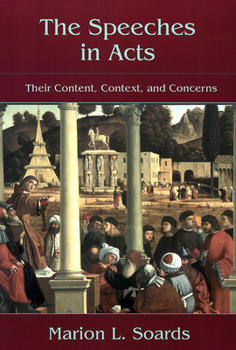The speeches in Acts
Select Format
Select Condition 
Book Overview
This historical reappraisal of the Acts of the Apostles, written in narrative form, allows the reader to understand the biblical author's worldview, historical and ideological assumptions, and purposes as they were communicated through portions of this work. Marion Soards analyzes the speech texts by comparing them to writings from ancient history, rhetoric, and midrashic interpretation of scripture. He points out the interesting features in the speeches and highlights the thematic similarities. Soards provides a clear picture of the manner of writings in Acts, the theology, and the encompassing history of the early Christian period, and he supplies a sound basis for contemporary Jewish-Christian relations.
Format:Paperback
Language:English
ISBN:0664252214
ISBN13:9780664252212
Release Date:March 1994
Publisher:Westminster John Knox Press
Length:236 Pages
Weight:0.80 lbs.
Dimensions:0.7" x 6.0" x 9.0"
Customer Reviews
1 rating
A Critical Reveiw of "The Speeches in Acts"
Published by Thriftbooks.com User , 19 years ago
In his book The Speeches in Acts Marion Soards seeks to explain and interpret both the content and purpose of the speeches in the book of Acts. The author holds to the position that the content of each speech is best understood by examining Luke's overall purpose and greater rhetorical aims for the speeches as a whole. Soards asserts that a comprehensive understanding of the speeches within Acts does not come from compartmentalization of discrete speech groups (i.e. speeches organized by authorship, literary type, etc.) as works by Debelius, Schneider, and other prominent New Testament scholars have done in the past. Instead he contends that the speeches themselves are the sole medium of unity within Acts serving as Luke's method of guiding the overall narrative through a plurality of ever changing heroes, ethnicities, communities, geographical locations, and other seemingly unrelated events of Christian history to the greater accomplishment of Luke's theocentric historiography. The author's own words frame his thesis concisely as he says, "By considering the book [Acts] along these lines- diverse personalities, ethnic groups, communities, geographical regions, and historical moments are unified in Acts largely though the repetitive occurrence, form, and contents of the speeches. Thus when one asks, What is "the meaning to be attributed to the speeches in the work as a whole?" one finds that the speeches unify the Acts account, and through them Luke advances his theme of divinely commissioned unified witness to the ends of the earth." (p. 15) In his introduction (pp. 1-13) Soards quickly orients the reader to the current status of scholarship concerning the speeches in Acts with a brief history and introduces the reader to his thesis. Soards presents strong evidence for his working assumption that the speeches in Acts are more the creations of Luke himself rather than an objective historical record of the ipsissima verba of the historical figure. He begins the development of his argument by commenting that much of the research on the speeches in Acts has been shaped by the famous statement from Thucydides (a Greco-Roman writer from antiquity) on his practice of recording speeches which "has been, while keeping as closely as possible to the general sense of the words that were actually said, to have speakers say what, in my view, was called for by each situation." (p. 1). Soards briefly summarizes the fruit of biblical scholarship as it has moved forward with this analytical orientation concerning the nature of Acts's speeches by summarizing the three main critical conceptions of the speeches: 1) The speeches are a literary device 2) The speeches are a convention of historiography 3) The speeches are a theological (or ideological) device [pp. 9-10]. It is the author's view that any one of these individual perspectives fails to completely and comprehensively explain Luke's usage of the speeches within Acts. He makes the point that the practice o





